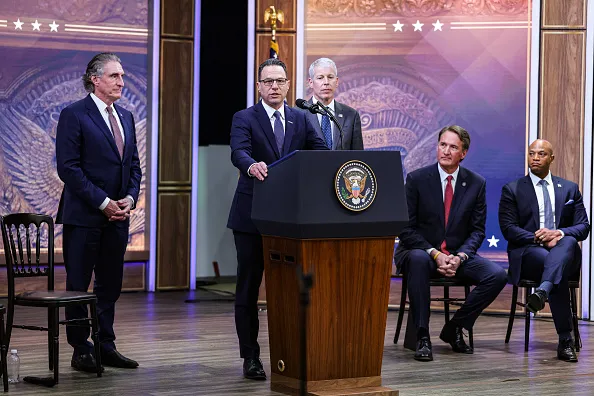Community solar plans stalled in Pennsylvania
The article discusses ongoing delays in advancing community solar plans in Pennsylvania due to federal policy uncertainties adn the state’s budget impasse. Pennsylvania lawmakers, led by Rep. Peter Schweyer (D-Allentown), are pushing legislation aimed at integrating community solar into the state’s broader energy strategy to meet increasing electricity demands from data centers and other industries. Schweyer’s bill, House Bill 1155, which recently added anaerobic digesters to eligible projects, seeks to help consumers reduce electric bills while strengthening the grid without imposing financial burdens on non-participants.
Despite bipartisan support for a diverse energy mix-including coal, natural gas, solar, wind, and hydropower-progress is hindered by concerns over potential federal clawbacks of renewable energy tax credits and the prioritization of budget issues. Schweyer highlights the need for Pennsylvania to increase electricity generation as older power plants retire and demand rises, emphasizing the importance of maintaining the state’s role as an energy exporter.
The article also features insights from Matt Hargarten of the Coalition for Community Solar Access, who notes that nearly 20 states and D.C. have adopted community solar policies that allow people unable to install solar panels at their homes-such as renters-to benefit from solar energy.These projects are typically small-scale, located near communities, and can stimulate economic progress while providing consumers with more energy choices. Schweyer’s bill includes provisions for project decommissioning, and while Pennsylvania’s Public Utility Commission could mandate battery programs, the current focus is on developing local, community-based solar initiatives.
the discussion underscores the political and practical challenges of expanding renewable energy in Pennsylvania but stresses the importance of solar as part of a extensive energy plan to ensure reliable electricity, affordable costs, and continued economic growth.
Community solar plans stalled in Pennsylvania
(The Center Square) – Pennsylvania lawmakers want to make community solar part of the state’s broader energy strategy to meet rising electricity demands from data centers and other high-powered industries, but federal policy uncertainties and the commonwealth’s budget impasse delay its progress.
Rep. Peter Schweyer, D-Allentown, has again authored legislation he says would allow the average consumer to reduce their electric bill while simultaneously strengthening the energy grid. The legislation would not place the financial onus entirely on subscribers and would not burden non-subscribers.
A previous version of the bill passed the House but stalled in the Senate last session. Schweyer told The Center Square that a key update in House Bill 1155 adds anaerobic digesters to eligible projects. The bill has been referred to the House Energy and Environmental Resources Committee for consideration.
He expressed strong support for a diverse set of energy resources, stating he is not opposed to coal, natural gas, solar, wind, or hydropower, and he has supported fossil fuel industry initiatives in the past.
“I think we need all of the above,” Schweyer said, adding that he believes Democrats and Republicans agree on far more than they disagree on when it comes to energy generation in the commonwealth.
We understand the importance of being an energy exporter, but as more high-energy users come online, we risk losing that status, he said. Electricity sources are retiring faster than new ones are able to replace them, while demand rises. So, Pennsylvania must increase generation to ensure a reliable supply, keep consumer costs low, and maintain its ability to sell excess power.
Schweyer points to unknown impacts from federal claw-backs on renewable energy tax credits passed in the One Big Beautiful Bill and the focus on the state’s current budget impasse as reasons that his bill hasn’t made much progress to date.
Although there is a particular urgency to it, he said he knows there’s a priority list, “and this will never be more of a priority than a budget issue.”
Schweyer explained that the Biden-era Inflation Reduction Act included subsidies to reduce upfront construction costs for solar projects. So, they are still awaiting guidance on how cuts through the federal budget reconciliation bill might impact their ability to use those funds for solar development in the Commonwealth.
He also said he appreciates Gov. Josh Shapiro’s desire to prioritize energy production as part of his Lightning Plan and hopes that, as we move forward, solar will be in the mix.
Pennsylvania is well-positioned to attract more data centers, which bring construction jobs, technology investment, and both long- and short-term economic growth, Schweyer said. These facilities also provide property tax revenue without adding costs to local schools.
Matt Hargarten, vice president of government and public affairs for the Coalition for Community Solar Access, told Center Square that 19 states and the District of Columbia have adopted policies enabling third-party community solar programs.
The most robust programs are in Colorado, Illinois, Maine, Maryland, Massachusetts, Minnesota, New Mexico, New Jersey, New York, and Virginia.
He explained that these programs allow those who cannot place solar panels on their property, such as renters, to take advantage of solar energy benefits.
According to Hargarten, the projects are typically small-scale and in the 1MW-5 MW range – or five to 30 acres of land – and located closer to where people live. One megawatt powers approximately 190 homes.
He said it’s a great way to stimulate economic development, give customers more choice, and bring new energy resources online.
Many of the projects are dual-use facilities – farms that lease portions of their land while keeping other parts in production – versus utility-scale projects consisting of hundreds, if not thousands, of acres.
Schweyer’s bill, he said, also has some decommissioning language in it to provide a process should the farmer or community want to discontinue project use.
And, while the PUC could create and mandate a battery program on these, currently, it’s just new, local, homegrown load in Pennsylvania, Hargarten said.
WRIGHT BACKS TRUMP ARGUMENT BLAMING RENEWABLES FOR RISING ELECTRICITY PRICES
Schweyer acknowledges that politics may play a role in all of this, but said they should be able to have a robust conversation about an energy package for Pennsylvanians.
“The solar piece is one of the smaller parts of it and won’t solve all our energy problems,” Schweyer said. “It’s just part of an overall strategy to generate more electricity, keep prices affordable for consumers, and continue the economic development that both Democrats and Republicans very much support.”
" Conservative News Daily does not always share or support the views and opinions expressed here; they are just those of the writer."


